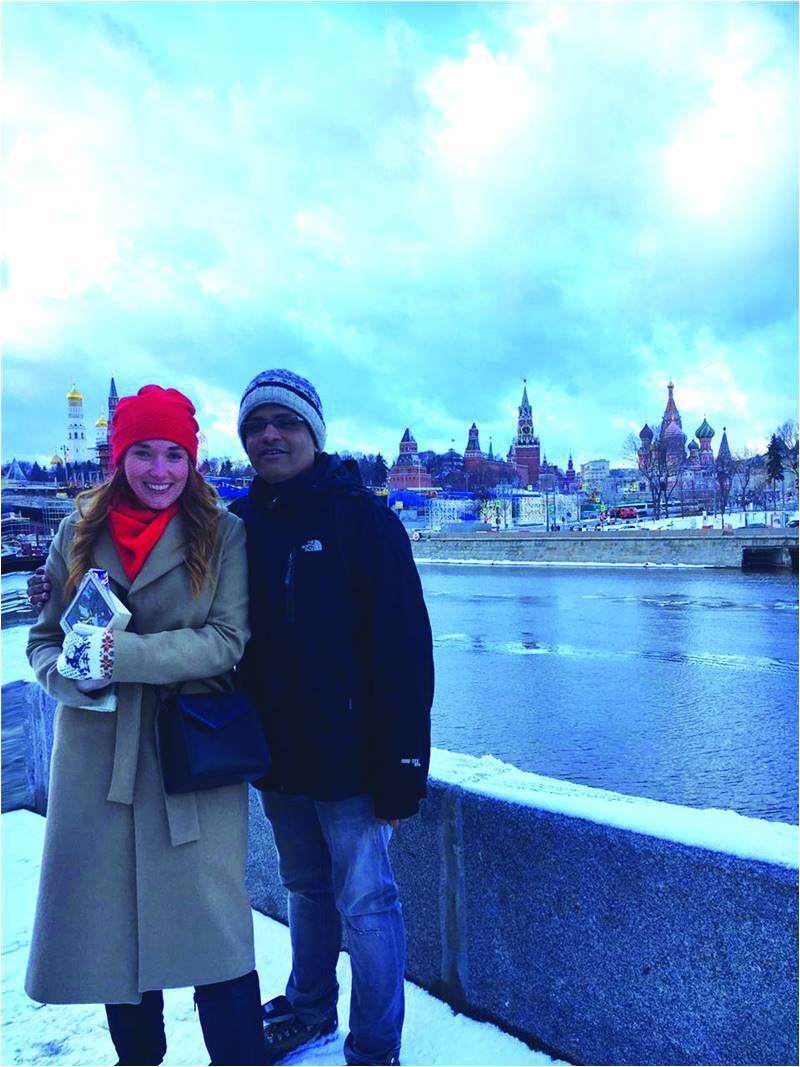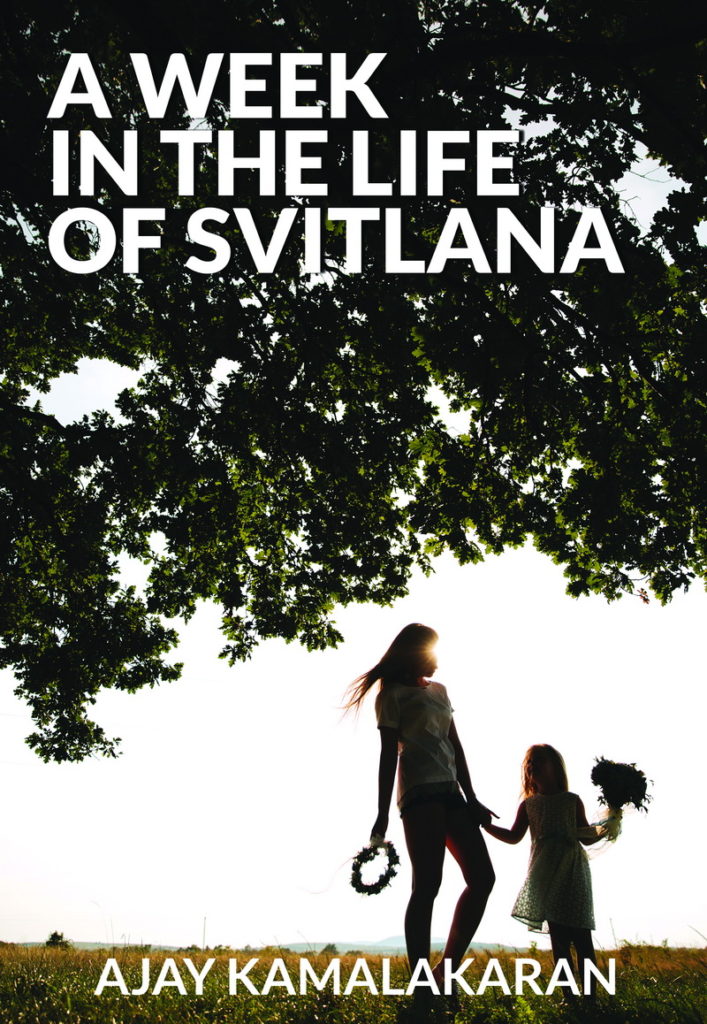
Released on the 5th of November in Colombo by renowned Sri Lankan author and artist Sybil Wettasinghe, A Week in the life of Svitlana by Ajay Kamalakaran is an interesting glimpse into life in Moscow. Talking about conflicting loyalties of Svitlana Khristenko, a Moscow-based Ukrainian woman who holds dual citizenship of both Ukraine and Russia, this short novel takes us through a week in her life, as the name suggests.
Bringing together his experiences of being a journalist and a writer, Ajay Kamalakaran tries to shed some light on life in Moscow which, he believes, shines and sparkles. He lived in Russia for almost a decade, working in print media in various capacities. His stay was long enough to make him fall in love with this beautiful and sophisticated part of Russia which was often compared to Western Europe for its elegance. Interesting he made his debut also with a collection of short stories inspired from Russia, called Globetrotting for Love and Other Stories from Sakhalin Island. This is his second novel.

When asked about his inspiration behind this book he goes on to say,
When I interacted with visitors and expatriates in the Russian capital, I realised that their Moscow was much smaller and more restricted than the real Moscow. Since I have many friends from all walks of life in the city, I had a chance to see so many different layers of life in the city and come across many interesting people. I felt that Moscow had many stories to tell the world and I wanted to pass on some of these stories to a non-Russian and non-Russian speaking audience.”
With a hauntingly beautiful cover that sets the tone for a reader, this book is intriguing from the word go. The chapters are neatly divided into the seven days of the week and along with Svitlana’s life, the reader also gets a glimpse of Moscow and its must-see places. In Kamalakaran’s own words, it is a virtual tour of Moscow and the lives of Muscovites.
Interweaving themes of love, longing and despair, Svitlana’s story is one that overwhelms in different ways. For starters, she seems like any other woman in the world. She is thirty-five, twice divorced with a child and dreams of settling down with a nice man. Despite being a strong and independent woman, she craves for a partner who can give her a comfortable life, taking away all her struggles for day to day existence.
When her friend complains about her lover’s roving eyes Svitlana’s reaction is akin to that of what most of are used to believe in. “Men will be men!” she exclaims adding voice to her own fears of being unable to find a decent man to settle down with in life. In her dealings with friends and colleagues, she comes across as a compassionate and considerate individual. Though she was resilient in walking out of both her abusive marriages, she still holds a soft corner for the father of her child Nella as he makes their daughter happy, ignoring his un-supportive behavior otherwise. Her thoughts clearly reflect in her actions when she ensures he is helped to secure a bail after his arrest.
As we delve deeper into the story, we see the things which make Svitlana stand out. She is liberal in her thoughts, because of which she didn’t think twice before getting married to a man younger to her or even walking out of the marriages when they didn’t pan out the way she had expected them to. Although she worked at a boutique to pay the bills, she kept the artist in her alive by sketching whenever possible. She guarded her personal space fiercely and knew what she wanted in life clearly. Be it her me-time spent listening to her favorite music or spending time with her daughter at the park, she always made time for anything that made her feel good about being alive. Both she and her daughter feel they are Muscovites before anything else. In a way their lifestyle would be considered more Western than Russian. Like many other Muscovites as they identify themselves closely with Europe.

Today, thanks to technology, the world has practically shrunk. The whole world is open to anyone who is talented in terms of opportunities. However, the most crucial question that always arises in such scenarios is: where do our loyalties lie? Is it to the country that is our birth place or to the place that has ensured we have a living, giving us an identity? What if someone wants to be loyal to both? Can such a person’s loyalty be questioned because they are unable to make a choice?
Drawing heavily from this debate, Kamalakaran shows us the ongoing conflict in the mind of Svitlana who is a Ukrainian by birth but a Russian-Ukrainian citizen by choice. Set in 2015, the story talks about a time when the political tensions between Russia and Ukraine have risen to an extent that the society now stands divided. People who choose sides are clearly labeled and looked down upon. Svitlana might harbour strong political views, but at the end of the day her sole aim is to have a good life for her daughter. What follows next is an intriguing account of contemporary Russian society.
Kamalakaran has a way with characters. He brings them to life through his descriptions and layers them with detailed narratives, bringing out finer nuances of story telling in his book. Written in third person this novel, highlights some of the lesser known aspects of post-Soviet life. His vivid descriptions paired with an evocative narrative, make this an engaging read. The over all tone is lucid, infused with certain amount of satire as he looks at Svitlana’s life perceptively. Instead of making it heavily melodramatic, he makes sure this saga is engaging and alluring till the last page.
In the hindsight, A Week in the Life of Svitlana showcases the conflict of emotions an individual goes through personally and professionally due to the political conditions prevalent in the nation, exceptionally well – leaving a lot for the reader to ponder upon.
Namrata M is a writer and editor based in Mumbai, India
Bringing together his experiences of being a journalist and a writer, Ajay Kamalakaran tries to shed some light on life in Moscow which, he believes, shines and sparkles. He lived in Russia for almost a decade, working in print media in various capacities. His stay was long enough to make him fall in love with this beautiful and sophisticated part of Russia which was often compared to Western Europe for its elegance. Interesting he made his debut also with a collection of short stories inspired from Russia, called Globetrotting for Love and Other Stories from Sakhalin Island. This is his second novel.

When asked about his inspiration behind this book he goes on to say,
When I interacted with visitors and expatriates in the Russian capital, I realised that their Moscow was much smaller and more restricted than the real Moscow. Since I have many friends from all walks of life in the city, I had a chance to see so many different layers of life in the city and come across many interesting people. I felt that Moscow had many stories to tell the world and I wanted to pass on some of these stories to a non-Russian and non-Russian speaking audience.”
With a hauntingly beautiful cover that sets the tone for a reader, this book is intriguing from the word go. The chapters are neatly divided into the seven days of the week and along with Svitlana’s life, the reader also gets a glimpse of Moscow and its must-see places. In Kamalakaran’s own words, it is a virtual tour of Moscow and the lives of Muscovites.
Interweaving themes of love, longing and despair, Svitlana’s story is one that overwhelms in different ways. For starters, she seems like any other woman in the world. She is thirty-five, twice divorced with a child and dreams of settling down with a nice man. Despite being a strong and independent woman, she craves for a partner who can give her a comfortable life, taking away all her struggles for day to day existence.
When her friend complains about her lover’s roving eyes Svitlana’s reaction is akin to that of what most of are used to believe in. “Men will be men!” she exclaims adding voice to her own fears of being unable to find a decent man to settle down with in life. In her dealings with friends and colleagues, she comes across as a compassionate and considerate individual. Though she was resilient in walking out of both her abusive marriages, she still holds a soft corner for the father of her child Nella as he makes their daughter happy, ignoring his un-supportive behavior otherwise. Her thoughts clearly reflect in her actions when she ensures he is helped to secure a bail after his arrest.
As we delve deeper into the story, we see the things which make Svitlana stand out. She is liberal in her thoughts, because of which she didn’t think twice before getting married to a man younger to her or even walking out of the marriages when they didn’t pan out the way she had expected them to. Although she worked at a boutique to pay the bills, she kept the artist in her alive by sketching whenever possible. She guarded her personal space fiercely and knew what she wanted in life clearly. Be it her me-time spent listening to her favorite music or spending time with her daughter at the park, she always made time for anything that made her feel good about being alive. Both she and her daughter feel they are Muscovites before anything else. In a way their lifestyle would be considered more Western than Russian. Like many other Muscovites as they identify themselves closely with Europe.

Today, thanks to technology, the world has practically shrunk. The whole world is open to anyone who is talented in terms of opportunities. However, the most crucial question that always arises in such scenarios is: where do our loyalties lie? Is it to the country that is our birth place or to the place that has ensured we have a living, giving us an identity? What if someone wants to be loyal to both? Can such a person’s loyalty be questioned because they are unable to make a choice?
Drawing heavily from this debate, Kamalakaran shows us the ongoing conflict in the mind of Svitlana who is a Ukrainian by birth but a Russian-Ukrainian citizen by choice. Set in 2015, the story talks about a time when the political tensions between Russia and Ukraine have risen to an extent that the society now stands divided. People who choose sides are clearly labeled and looked down upon. Svitlana might harbour strong political views, but at the end of the day her sole aim is to have a good life for her daughter. What follows next is an intriguing account of contemporary Russian society.
Kamalakaran has a way with characters. He brings them to life through his descriptions and layers them with detailed narratives, bringing out finer nuances of story telling in his book. Written in third person this novel, highlights some of the lesser known aspects of post-Soviet life. His vivid descriptions paired with an evocative narrative, make this an engaging read. The over all tone is lucid, infused with certain amount of satire as he looks at Svitlana’s life perceptively. Instead of making it heavily melodramatic, he makes sure this saga is engaging and alluring till the last page.
In the hindsight, A Week in the Life of Svitlana showcases the conflict of emotions an individual goes through personally and professionally due to the political conditions prevalent in the nation, exceptionally well – leaving a lot for the reader to ponder upon.
Namrata M is a writer and editor based in Mumbai, India

